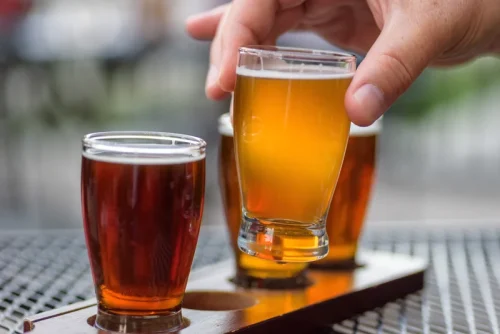
They also discussed studies that indicated higher levels of alcohol consumption have associations with an increased risk of stroke, atrial fibrillation, and heart failure. Research suggests drinking alcohol may thin the blood by affecting platelets, which are the parts of blood that https://ecosoberhouse.com/ initiate coagulation, or clotting. If you do drink alcohol while on blood thinners, do so in moderation. That means one drink a day for women and men age 65 and older.

What is the effect of alcohol on blood pressure?

The United Kingdom, France, Denmark, Holland and Australia recently reviewed new evidence and lowered their alcohol consumption recommendations. Ireland will require cancer warning labels on alcohol starting in 2026. Your doctor can help determine the cause of the bleeding and provide appropriate treatment. If you need help quitting or cutting down on alcohol, speak to a health professional who can give you advice or resources that might help support Twelve-step program you through the process. Depending on the type of blood thinner you are taking, there may be additional adverse effects.

Effects of Alcohol: How Alcohol Thins Your Blood
- They do come with side effects, though, such as hair loss, abdominal pain and gas.
- According to the UK Chief Medical Officers, exceeding 14 standard drinks per week increases health risks, including the risk of hypertension.
- For moderate drinkers, the blood-thinning effects of alcohol are short-lived.
- Over time, heavy alcohol use can lead to sustained high blood pressure (hypertension).
It is our hope that with increased awareness, more and more people will get help with their alcohol problems. Drinking to excess can lead to injuries, alcohol poisoning, violence, stillbirth/miscarriage, and risky sexual acts (sex with multiple partners, unprotected sex, etc.). Unprotected sex can lead to sexually transmitted diseases, such as HIV, or an unintended pregnancy.
Signs of Alcohol Abuse
Drinking too much alcohol can cause a sudden drop in blood pressure, leading to dizziness, fainting, and even shock. Monitoring your alcohol intake and being aware of these signs can help you manage your blood pressure more effectively. However, without the clotting function of your platelets, you could bleed out after getting a paper cut. Platelets (otherwise known as thrombocytes) gather at the site of an injury and stick to the injured blood vessel in order to staunch the bleeding by forming a clot. This covers the wound and prevents further blood from leaking out.
Increased Risk of Hypertension
For patients with cardiac problems in particular, it is important not to depend entirely on the consumption of alcohol for treatment of clot formation. At best, the effect of alcohol can last long enough if it is consumed in moderation and on every alternate day. If alcohol is abused, it can increase the risk of heart attacks and cause damage to other organs. Along with the hormone changes that alcohol triggers, that can keep your body from building new bone. Your bones get thinner and more fragile, a condition called osteoporosis. Alcohol also limits blood flow to your muscles and gets in the way of the proteins that build them up.
Is Beer a Blood Thinner?
This article explores how alcohol affects the ability of the blood to clot. Finally, it answers some common questions about alcohol and blood thinning. If you or does alcohol thicken blood someone you care about is displaying signs of alcohol addiction, our substance abuse treatment center in Stuart, FL, is here to help. Banyan has been helping people with addictions in communities across the nation achieve long-term sobriety, and you can be one of them.
Can alcohol lower blood pressure?
If you’re taking blood thinners or will be soon, quitting drinking is critically important. Platelets are small cells in the blood that are essential for clotting. When you cut yourself or experience an injury, platelets help to form a plug at the site of the injury to stop the bleeding.
The Long-Term Effects of Alcohol
Both high blood pressure and heart disease risk are increased in people who use the substance in excess for an extended period. Drinking alcohol in moderation may have a protective effect on your blood vessels. Some research finds that alcohol increases levels of high-density lipoproteins (HDL, aka “good cholesterol”). This healthy type of cholesterol helps protect your arteries and prevent the blood clots that can lead to heart attacks and strokes.
How drinking alcohol can affect your health
Several studies have been published that link heart health with red wine, as Mayo Clinic reports that a daily glass of red wine may have certain health benefits. However, this lack of blood clotting caused by alcohol could also potentially increase your risk for hemorrhagic strokes or strokes that occur when weak blood vessels burst. The risk of “bleeds” or bleeding strokes also increases as a result of heavy alcohol use. The UK Chief Medical Officers advise against drinking more than 14 standard drinks per week to minimize health risks, including high blood pressure alcohol and cardiovascular disease.
For Immediate Treatment Help Call 800-526-5053
- To keep it all going smoothly, you need them in the right balance.
- When a blood clot blocks the flow of blood to your heart, a heart attack can occur.
- The effects of alcohol on the blood are either short- or long-term.
- Always ask your doctor if it’s safe for you to consume alcohol while taking blood thinners.
- That advice was considered and rejected when the federal recommendations came out in 2020.
Schedule your appointment with Avicenna Cardiology and let our expert team guide you toward a healthier, stronger heart. Whether you’re managing existing conditions or looking to prevent future risks, we’re here to help every step of the way. Alcohol disrupts the normal function of blood vessels, making them less elastic and impairing blood flow, which can increase blood pressure alcohol.
